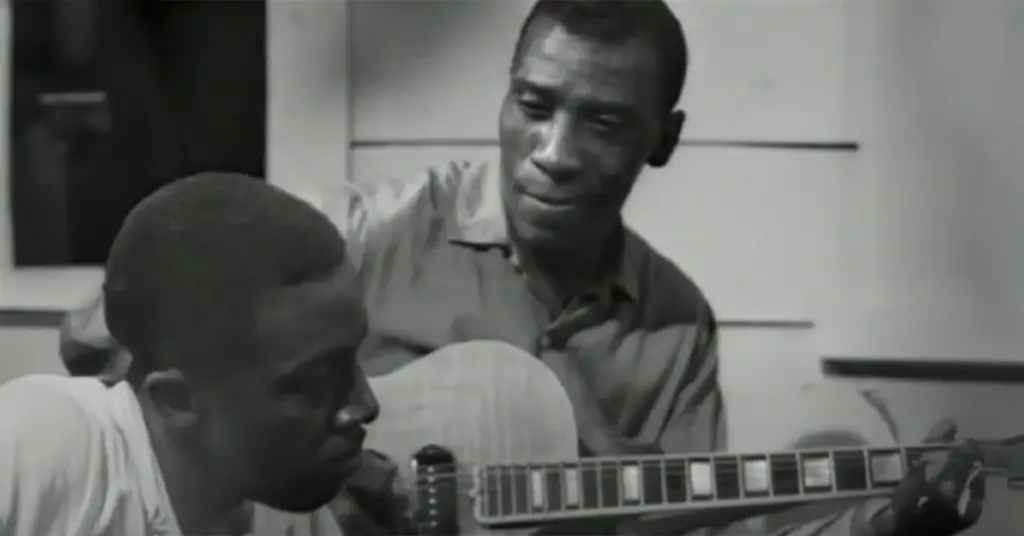The Original Electric Blues King – How T-Bone Walker Taught the World to Play with Feeling
Every great blues guitarist I’ve ever loved—B.B. King, Albert Collins, Stevie Ray Vaughan, Joe Bonamassa—they all trace back to one man: T-Bone Walker.
I still remember the first time I heard “Call It Stormy Monday”. I was expecting something raw and rough, but what I got was elegance, soul, and class.
And that guitar tone? Clean, jazzy, perfectly phrased—it felt like hearing the birth of modern blues guitar.
I didn’t know it yet, but I had just stepped into the house that T-Bone built.
Who Was T-Bone Walker?
T-Bone Walker (1910–1975) was one of the first musicians to play blues on the electric guitar—and he didn’t just plug in.
He reinvented the instrument.
Born in Linden, Texas, and raised in Dallas, T-Bone came from a musical family. He was influenced by Blind Lemon Jefferson (who he reportedly worked for as a teenager), but by the 1930s and ’40s, he was forging a sound all his own.
With his smooth vocals, jazz-influenced guitar runs, and debonair style, T-Bone wasn’t just a bluesman—he was a showman, a stylist, a pioneer.
And everyone took notice.
What Made T-Bone So Revolutionary?
When T-Bone Walker plugged in his guitar in the late 1930s, he changed the course of blues—and rock music—forever.
- 🎸 He was the first to treat the electric guitar as a lead instrument in the blues.
- 🎶 His phrasing was fluid and lyrical, inspired by horn players like Charlie Christian.
- 🕺 He had charisma to spare—he’d play behind his back, do the splits, even play the guitar with his teeth… long before Hendrix.
But most of all, he had soulful restraint.
T-Bone didn’t blast you with volume—he caressed every note. He made the guitar sing, whisper, cry, and swoon.
And man… could he swing.
The Albums That Brought It All Home
There are many compilations and recordings, but these are the ones that made me a lifelong fan:
- 🎧 T-Bone Blues (1959) – This is essential listening. Includes “Stormy Monday,” “T-Bone Shuffle,” “Mean Old World,” and more. Recorded for Atlantic, this album captures T-Bone at his very best.
- 🎙️ The Complete Imperial Recordings: 1950–1954 – A treasure trove of slick guitar lines, smooth vocals, and timeless blues storytelling.
- 🔥 The Very Best of T-Bone Walker – A great place for newcomers to start. Covers all the important bases with good sound quality.
“Stormy Monday” – The Blueprint
Let’s talk about “Call It Stormy Monday (But Tuesday Is Just as Bad)” for a second.
It’s been covered by literally everyone—The Allman Brothers, Bobby “Blue” Bland, Eva Cassidy, and of course, B.B. King. But T-Bone’s original version?
It’s pure atmosphere.
The chords, the subtle vibrato, the behind-the-beat vocals… it sets the tone for what blues could be when it’s elegant, moody, and heartbroken.
That song alone could’ve earned him a place in the Blues Hall of Fame.
Why T-Bone Walker Still Matters
Without T-Bone Walker, there’s no electric blues as we know it.
There’s no B.B. King, no Albert King, no Freddie King.
No Clapton, no SRV, no Bonamassa.
He’s the origin point—the guy who first made the guitar talk, swing, and cry on stage.
He proved the blues didn’t have to be rough—it could be smooth, sharp, and refined while still being full of soul.
Even now, when I hear modern blues guitarists bend a note just the right way… I swear I can hear T-Bone smiling from somewhere in the groove.
Where to Start If You’re New
Want to dive into the world of T-Bone? Here’s your blues starter kit:
- 🎶 T-Bone Blues – Absolute must-listen.
- 💿 The Complete Imperial Recordings – For the deep cuts and real fans.
- 📺 YouTube: Look up “T-Bone Walker live,” “Stormy Monday 1947,” or “T-Bone Shuffle” to see the real deal in motion.
T-Bone Walker wasn’t just ahead of his time—he defined his time.
And he’s still defining ours.
If you play guitar, love blues, or just appreciate great music, take a moment to listen to the man who started it all.
Because once you feel that smooth swing and aching soul, there’s no going back.



Facebook Comments